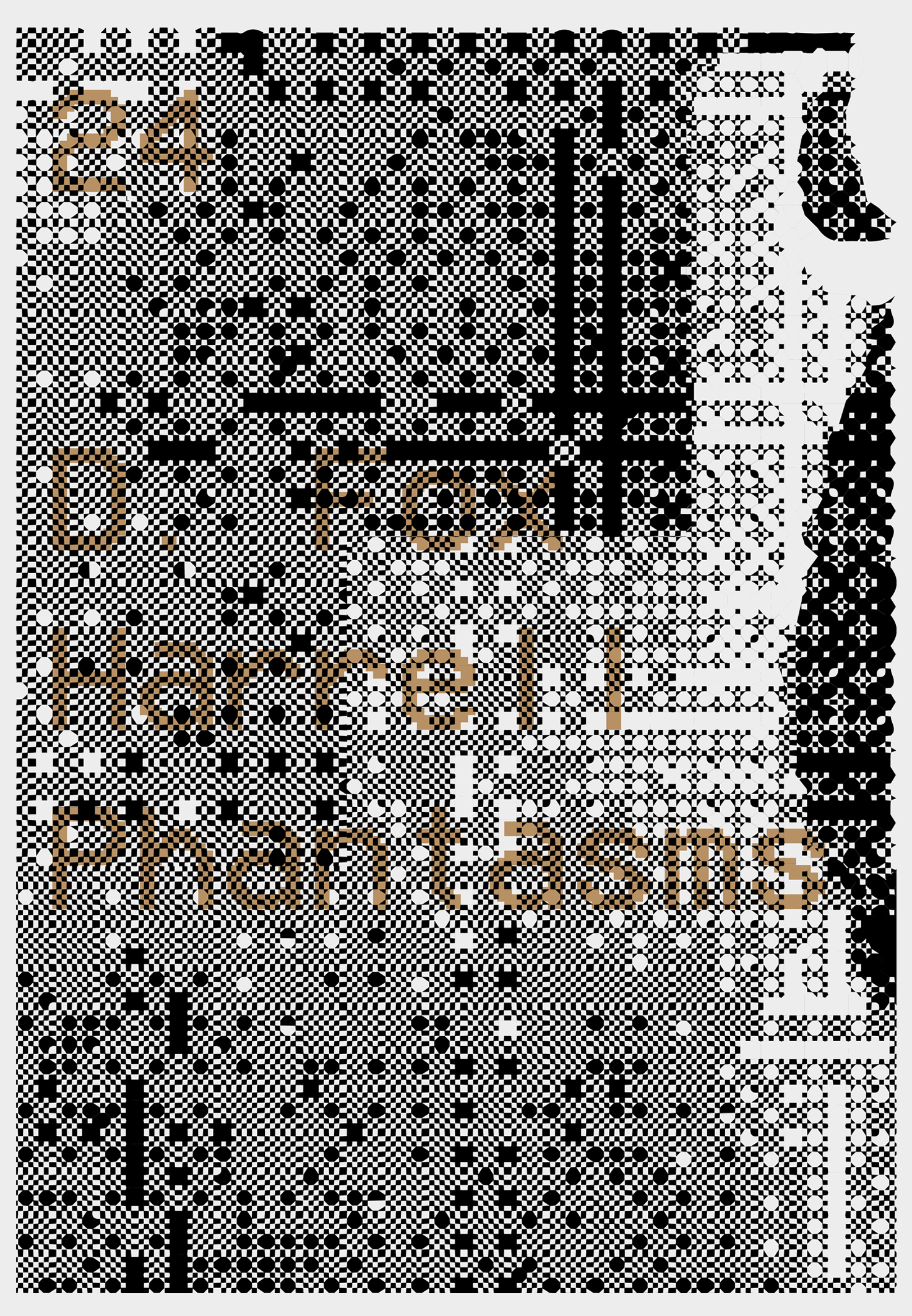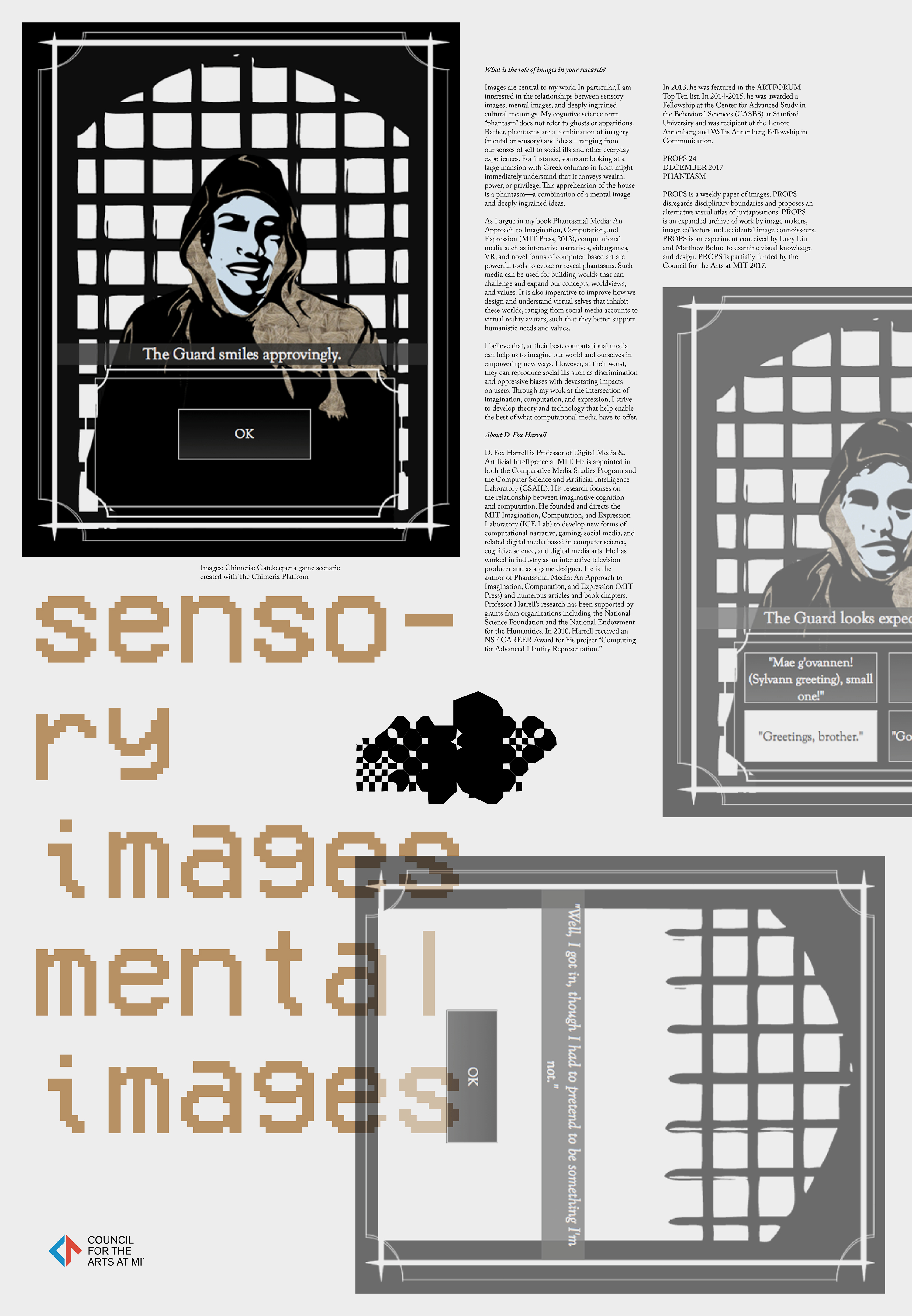

24 PHANTASMS
D. FOX HARRELL︎︎︎
Images are central to my work. In particular, I am interested in the relationships between sensory images, mental images, and deeply ingrained cultural meanings. My cognitive science term “phantasm” does not refer to ghosts or apparitions. Rather, phantasms are a combination of imagery (mental or sensory) and ideas – ranging from our senses of self to social ills and other everyday experiences. For instance, someone looking at a large mansion with Greek columns in front might immediately understand that it conveys wealth, power, or privilege. This apprehension of the house is a phantasm—a combination of a mental image and deeply ingrained ideas.
As I argue in my book Phantasmal Media: An Approach to Imagination, Computation, and Expression, computational media such as interactive narratives, videogames, VR, and novel forms of computer-based art are powerful tools to evoke or reveal phantasms. Such media can be used for building worlds that can challenge and expand our concepts, worldviews, and values. It is also imperative to improve how we design and understand virtual selves that inhabit these worlds, ranging from social media accounts to virtual reality avatars, such that they better support humanistic needs and values.
I believe that, at their best, computational media can help us to imagine our world and ourselves in empowering new ways. However, at their worst, they can reproduce social ills such as discrimination and oppressive biases with devastating impacts on users. Through my work at the intersection of imagination, computation, and expression, I strive to develop theory and technology that help enable the best of what computational media have to offer.
D. FOX HARRELL︎︎︎ is Professor of Digital Media & Artificial Intelligence at MIT. He is appointed in both the Comparative Media Studies Program and the Computer Science and Artificial Intelligence Laboratory (CSAIL). His research focuses on the relationship between imaginative cognition and computation. He founded and directs the MIT Imagination, Computation, and Expression Laboratory (ICE Lab) to develop new forms of computational narrative, gaming, social media, and related digital media based in computer science, cognitive science, and digital media arts. He has worked in industry as an interactive television producer and as a game designer. He is the author of Phantasmal Media: An Approach to Imagination, Computation, and Expression (MIT Press, 2013) and numerous articles and book chapters. Professor Harrell’s research has been supported by grants from organizations including the National Science Foundation and the National Endowment for the Humanities.
Images are central to my work. In particular, I am interested in the relationships between sensory images, mental images, and deeply ingrained cultural meanings. My cognitive science term “phantasm” does not refer to ghosts or apparitions. Rather, phantasms are a combination of imagery (mental or sensory) and ideas – ranging from our senses of self to social ills and other everyday experiences. For instance, someone looking at a large mansion with Greek columns in front might immediately understand that it conveys wealth, power, or privilege. This apprehension of the house is a phantasm—a combination of a mental image and deeply ingrained ideas.
As I argue in my book Phantasmal Media: An Approach to Imagination, Computation, and Expression, computational media such as interactive narratives, videogames, VR, and novel forms of computer-based art are powerful tools to evoke or reveal phantasms. Such media can be used for building worlds that can challenge and expand our concepts, worldviews, and values. It is also imperative to improve how we design and understand virtual selves that inhabit these worlds, ranging from social media accounts to virtual reality avatars, such that they better support humanistic needs and values.
I believe that, at their best, computational media can help us to imagine our world and ourselves in empowering new ways. However, at their worst, they can reproduce social ills such as discrimination and oppressive biases with devastating impacts on users. Through my work at the intersection of imagination, computation, and expression, I strive to develop theory and technology that help enable the best of what computational media have to offer.
D. FOX HARRELL︎︎︎ is Professor of Digital Media & Artificial Intelligence at MIT. He is appointed in both the Comparative Media Studies Program and the Computer Science and Artificial Intelligence Laboratory (CSAIL). His research focuses on the relationship between imaginative cognition and computation. He founded and directs the MIT Imagination, Computation, and Expression Laboratory (ICE Lab) to develop new forms of computational narrative, gaming, social media, and related digital media based in computer science, cognitive science, and digital media arts. He has worked in industry as an interactive television producer and as a game designer. He is the author of Phantasmal Media: An Approach to Imagination, Computation, and Expression (MIT Press, 2013) and numerous articles and book chapters. Professor Harrell’s research has been supported by grants from organizations including the National Science Foundation and the National Endowment for the Humanities.